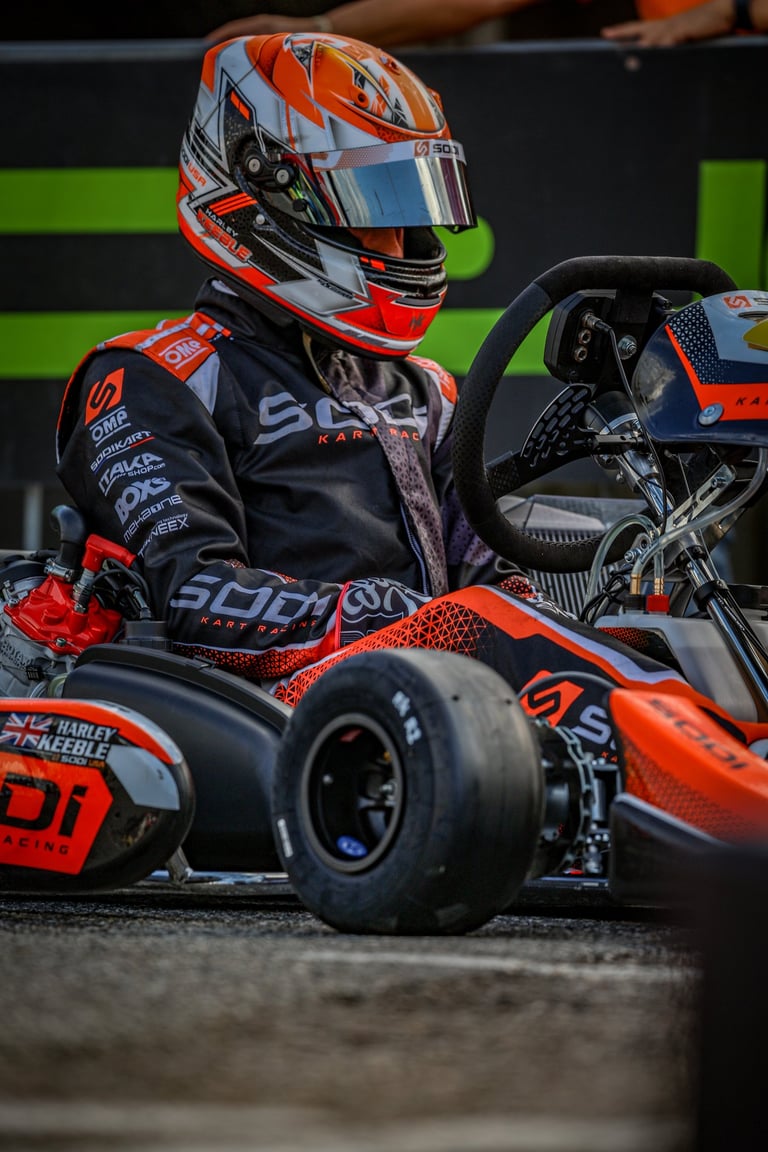Best Karting Gear Ratios – How to Choose the Right Sprocket Setup
Learn how to choose the best karting gear ratio for your setup. Use our gear ratio chart to compare 11T, 12T, and 13T sprockets and optimize speed and performance.
KARTINGGEARS
Jon Jong
3/1/20252 min read

Choosing the Right Gear Ratio for Your Kart – Complete Guide
Why Gear Ratios Matter in Karting
Selecting the right gear ratio is crucial for optimizing your kart’s acceleration, top speed, and overall performance on the track. Whether you're racing on a tight technical circuit or a high-speed track with long straights, your sprocket setup can make a significant difference in lap times.
This guide is specifically geared towards Rotax 125 MAX Senior/Junior EVO engines, which use 11T, 12T, and 13T front drive sprockets. If you're running a different engine, such as IAME X30, KA100, or ROK GP, you may have smaller front sprocket options (e.g., 9T or 10T). Be sure to check your engine’s gearing recommendations before selecting a setup.

Understanding Gear Ratios in Karting
A kart’s gear ratio is determined by dividing the number of teeth on the rear sprocket by the number of teeth on the front (drive) sprocket.
📌 Gear Ratio = Rear Sprocket Teeth ÷ Front Sprocket Teeth
For example, if you're running a 12T front sprocket and a 78T rear sprocket:
78 ÷ 12 = 6.50
This means your gear ratio is 6.50:1, meaning the engine turns 6.5 times for every full rotation of the rear axle.
Formula for Gear Ratio
How Gear Ratios Affect Performance
Lower Gear Ratio (Numerically Smaller)
✅ More Top Speed
✅ Slower Acceleration
✅ Better for long straights & high-speed tracks
Example: 13T/76T = 5.846 → Higher top speed, but slower off the corners.
Higher Gear Ratio (Numerically Larger)
✅ Faster Acceleration
✅ Lower Top Speed
✅ Better for short tracks with tight corners
Example: 11T/86T = 7.818 → Great off the corners but will hit the rev limiter sooner.

Choosing the Best Gear Ratio for Your Track
Every track is different, so your gear selection depends on the track layout and driving style. Here’s a simple way to determine your ideal ratio:
🏎️ For Tracks with Long Straights → Use a lower gear ratio (smaller rear sprocket) for higher top speed.
🏎️ For Tight, Technical Tracks → Use a higher gear ratio (larger rear sprocket) for quicker acceleration out of corners.
🏎️ For Balanced Tracks → Find a middle-ground ratio that provides both good acceleration and enough top speed.
🏎️ For Non-Rotax Engines → If you're running an IAME, ROK, or another engine, check your engine's optimal drive sprocket size, as it may differ from the 11T-13T range used in Rotax gearing.
Gear Ratio Chart – 11T, 12T, and 13T Sprockets
To help you pick the right setup, here’s a gear ratio and speed chart for different front and rear sprocket combinations based on a Rotax 125 MAX Senior EVO engine with a max RPM of 14,800 and 272mm rear tire diameter (MG Yellow).

Final Thoughts – Optimize Your Gear Ratio for the Best Performance
Choosing the right gear ratio is a balance between acceleration and top speed. Test different sprocket combinations at your track to see what works best for your kart and driving style.
👉 Still unsure? Reach out for expert advice on gear ratios and kart setup!
🏎️ See you at the track!
Have Questions? Get in Touch
Need more details on engine rebuilds, maintenance, or karting resources? Contact Nashville Karting Group for expert advice and support. We're here to help!


Nashville Karting Group
Your premier karting resource in Tennessee!
Contact
info@nashvillekartinggroup.com
615-933-1144
© 2026. All rights reserved.
